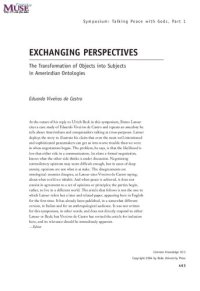
Ebook: Exchanging Perspectives: The Transformation of Objects into Subjects in Amerindian Ontologies
Author: Eduardo Viveiros de Castro
- Year: 2004
- Publisher: Duke University Press
- City: Durham
- Language: English
- pdf
Originally published in 2004 in the Common Knowledge symposium “Talking Peace with Gods,” this article elaborates the nature and consequences of the perspectivist cosmologies of Amerindian societies. Contemporary Western cosmologies regard humans as ex-animals who became differentiated from other nonhuman species through the acquisition of advanced cognitive capacities. Amerindian cultures, by contrast, regard animals as ex-humans who became differentiated from both modern humans and other animal species via a series of physical adaptations. Underneath these physical differences, both humans and nonhumans retain a shared human soul; what is more, each species perceives its own kind as human and all other kinds—including humans—as animals. Viveiros de Castro distinguishes this “perspectivism” from relativism: whereas Western relativism assumes multiple valid cultural models, Amerindian perspectivism holds that human and nonhuman species possess a common values system and cultural framework. While this commonality is ordinarily obscured by biologically grounded, perceptual differences, the gap in perspective may be bridged by shamans, whose gift of adopting nonhuman subjectivities enables them to see other species as they see themselves—namely, as humans partaking in human culture. Perspectivism influences both the practices that Amerindian peoples adopt toward nonhuman species and their attitudes toward other human groups, especially in the context of warfare. The Amerindian warrior’s capacity to overcome an enemy ultimately depends on a shaman-like entry into the subjectivity of another: rather than denying the personhood of his enemy, the Amerindian warrior must acknowledge the affinity between them.
Download the book Exchanging Perspectives: The Transformation of Objects into Subjects in Amerindian Ontologies for free or read online
Continue reading on any device:

Last viewed books
Related books
{related-news}
Comments (0)